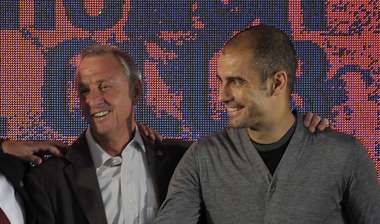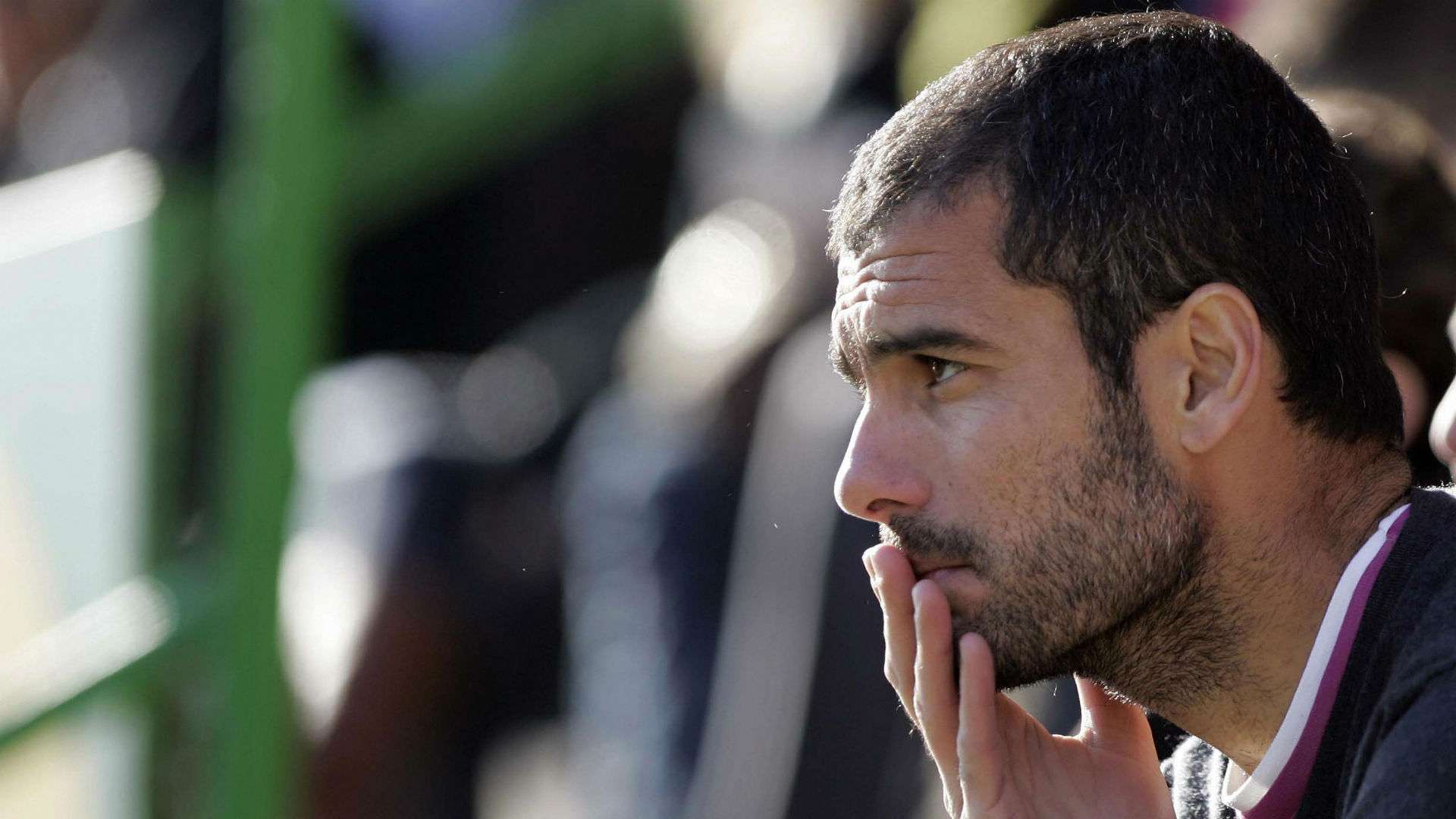When Pep Guardiola asked to be put in charge of newly relegated Barcelona B, rather than take the directorial role he was offered, the club were stunned. Few understood why he was turning down a prestigious position for a far harder, and messier, job.
Within a few months, Barcelona’s fears appeared to be confirmed. The B team, expected to bounce straight back up from the fourth tier, had won just one of their first three games of the season under the new manager. The club began to wonder whether they had made a big mistake.
It might seem strange to highlight a seemingly innocuous 2-2 draw between Masnou and Barcelona B as the most important game in Guardiola’s career, but that game – and the week preceding it – was a sliding doors moment for the Catalan, and by extension world football.
Guardiola wasted no time revolutionising Barcelona B in the summer of 2007. He made dramatic changes to the culture of the team, a prelude to what we would later see with the Barcelona first team, Bayern Munich, and Manchester City. The reforms included disbanding the C team to merge it with the B, introducing fines, scouting the opposition, and giving detailed 10-minute tactical presentations to the players.
He also immediately began implementing his ground-breaking tactical ideas. In short, he made the B team more professional, more serious, in the hope of lifting them from an historic low.
Next Match
But his faith in his own methods was not unshakeable, and after three games in charge, the scale of the challenge had revealed itself to the young coach. In the Tercera Division the pitches were small and boggy, while the players were less diligent, less sponge-like, than he had imagined.
Four points from three games led to a week of serious soul-searching.
“I thought I had to change because we could not play in that way,” he told Sky Sports in 2018. “I arrived Tuesday and I said we have to change because the pitches are so small. I doubted for two days. It was an important moment because I was new, I was not experienced.”

Guardiola held his nerve. He could easily have decided to adapt to the division’s norms, but instead he called Johan Cruyff, who advised him to get rid of any rebel players who weren’t taking him seriously, made some minor tweaks to adapt to the pitch size and ploughed on.
Barcelona B didn’t even win the next game, but having gone 2-0 up against Masnou, Guardiola had seen enough to renew his sense of conviction. It was the beginning of an eight-match unbeaten run, and although there were a few sticky patches still to come Guardiola oversaw an impressive second half of the season to win the league.
As Marti Perarnau writes in Pep Confidential, Guardiola considers lifting the fourth division title among his greatest achievements.
The subsequent success of that Barcelona B team, not to mention more than a decade of evidence of Guardiola’s genius, tells us he would have made it to the top of the game irrespective of that wobbly week.
However, had he not made those tweaks before the Masnou game, had he not called Cruyff, or had he temporarily lost faith in his philosophy and instilled a more pragmatic approach, then his rise could have been much slower – changing the landscape of world football today.
How Lampard's 'ghost goal' led to VAR chaos
Madrid, Maradona & the game that killed the European Cup
How Man Utd helped convince Abramovich to buy Chelsea
For starters, a continued early slump in the fourth tier would have ruled him out of the senior job. Frank Rijkaard’s increasingly shambolic team was crying out for an experienced leader, and it was only Guardiola’s beautiful football that made him a prime candidate despite falling short on this count.
If his revolution with the second string wasn’t attracting so much attention for its aestheticism, then Jose Mourinho would have run unopposed for the job.
Mourinho to Barcelona in 2008 would have turned football upside down. Guardiola’s influence on the sport – from Spain’s 2010 World Cup-winning tiki-taka to possession football dominating at the top for over a decade – stems directly from his ability to imprint his Cruyffian vision on Barcelona, the only club with the history and pedigree for such extreme tactical idealism.
Without the template of Guardiola’s Barcelona – a genius manager with the ideal club at the perfect moment in history – then perhaps his vision would not have so enraptured the sport in Europe, triggering its adoption across the continent, or its adaptations that led to Jurgen Klopp and the German gegenpressing model.
Perhaps, instead, the sport would have doubled down on Mourinho’s legacy, a highly-structured, defence-first ideology in vogue since the mid-2000s and largely uninterrupted until Guardiola emerged to re-popularise Cruyff’s ideals.
 Getty
GettyWe cannot know how many great teams and great managers of the last 10 years would not have existed if Guardiola’s tenure at Barcelona B got off to a slower start. But we do at least know we would have lost Pep’s extraordinary Barcelona of 2008-2011, the Mourinho-Guardiola rivalry that lit up La Liga in 2011-12, and Inter’s incredible treble-winning season in 2010.
We might also have lost Zinedine Zidane’s three-time European champions Real Madrid, given that Guardiola’s success at Barcelona influenced a generation of boardrooms to make unlikely, inexperienced appointments based on historical ties to the club. Promoting Zidane from the Real B team was a direct attempt by Florentino Perez to mimic Guardiola’s journey at Barca.
Finally, and perhaps most importantly, we may never have seen a Guardiola team playing quite so beautifully or idealistically as his Barcelona, Bayern Munich, and Man City teams at their peak. To aim for tactical purism requires bravery and unerring belief in the face of setbacks; requires a stubborn refusal to yield to pragmatism when confronted by failure.
By taking that leap at Barcelona B – where the stakes were lower, but the conditions considerably harder – and being rewarded for doing so, Guardiola put himself on a path of unwavering commitment to his philosophy.
“When I went to Barcelona and Bayern Munich, and even here in Manchester, when they say to me, 'You cannot play like that here', always I think, 'If I was able to do that in artificial conditions, I can do it here',” Guardiola told Goal in 2019.
“I thought that a lot of times in my first season [in England], when it wasn’t going well I thought, 'We can do it, because we did it there'. You just insist, insist, insist and do it better.”
And so that crucial week early in his tenure with the B team, when Guardiola agonised over his approach before deciding to press on, not only shaped European football for the next decade and a half but also helped make Guardiola the coach he is today.
“The fact is there, I had the fact in that year,” he said. “That’s why I could have changed, but I felt it in my skin, and I saw it, that we can do it.”


